Mises, Ludwig von. Human Action: A Treatise on Economics
Подождите немного. Документ загружается.

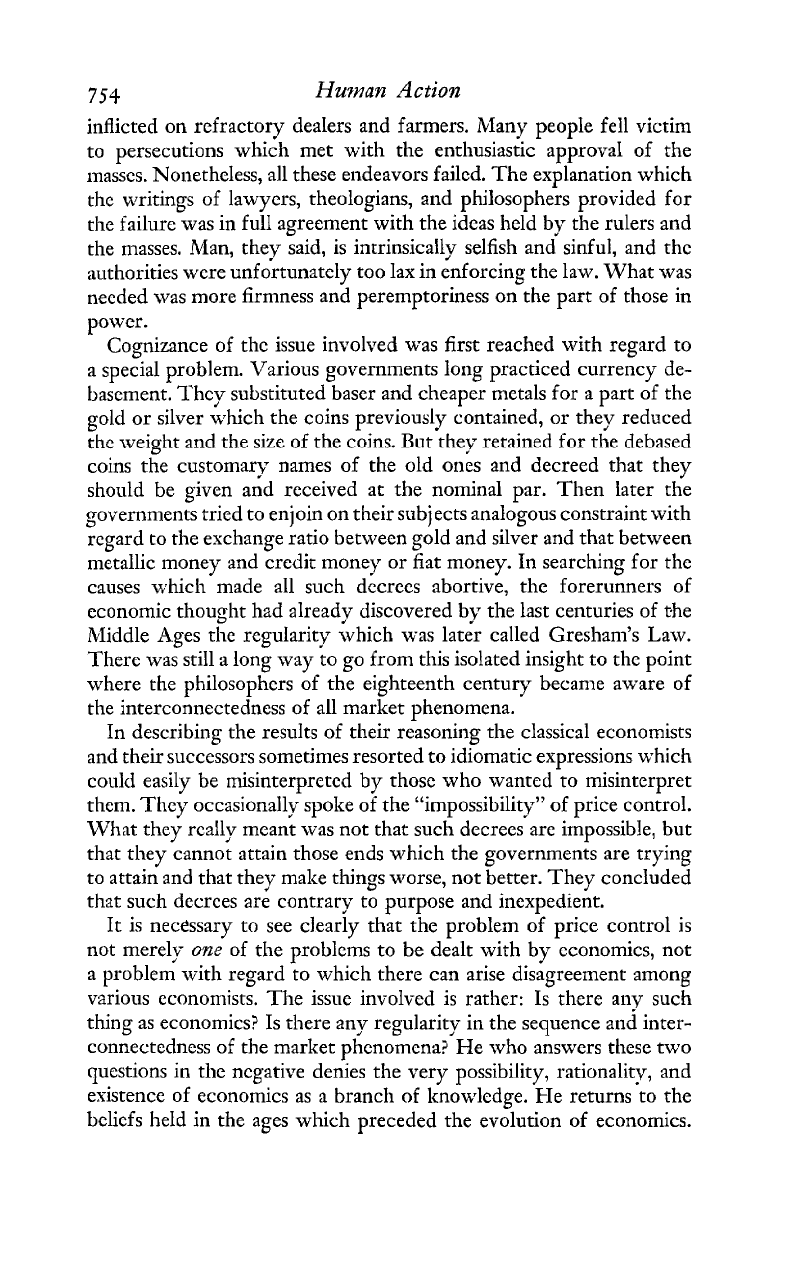
754
Huiwan
Action
inflicted on refractory dealers and farmers. Many people fell victim
to persecutions whidh met with the enthusiastic approd of the
masscs. Nonetheless, all these endeavors failed. The explanation which
thc writings
of
lawyers, theologians, and philosophers provided for
the failure was in full agreement with the ideas held by the rulers and
the nlasses. Man, they said, is intrinsically selfish and sinful, and thc
authorities were unfdrtunately too lax in enforcing the law. What was
needed was more firmness and peremptoriness on the part of those in
power.
Cognizance of the issue involved was first reached with regard to
a special problem. Various governments long practiced currency de-
basement. Thcy substituted baser and cheaper metals for a part of the
gold or silver which the coins previously contained, or they reduced
thc weight and the size of the coins.
But
they retained for the debased
coins the customary names of the old ones and decreed that they
should be given and received at the nominal par. Then iater the
governments tried to enjoin on their subjects analogous constraint with
regard to the exchange ratio between gold and silver and that between
metallic money and credit money or fiat money. In searching for the
causes which made all such dccrces abortive, the forerunners of
economic thought had already discovered by the last centuries of the
Middle Ages the regularity which was later called Gresham's Law.
There was still a long way to go from this isolated insight to the point
where the philosophers of the eighteenth century became aware of
the interconnectedness of all market phenomena.
In describing the results of their reasoning the classical economists
and their successors sometimes resorted to idiomatic expressions which
could easily be misinterpreted by those who wanted to misinterpret
them. They occasionally spoke of the "impossibility" of price control.
What they rcally meant was not that such decrees are impossible, but
that they cannot attain those ends which the governments are trying
to attain and that they make things worse, not better. They concluded
that such decrees are contrary to purpose and inexpedient.
It is necessary to see clearly that the problem of price control is
not merely
one
of the problems to be dealt with by economics, not
a problem with regard to which there can arise disagreement among
various economists. The issue involved is rather: Is there any such
thing as economics? Is there any regularity in the sequence and inter-
connectedness of the market phenomena? He who answers these two
questions in the ncgative denies the very possibility, rationality, and
existence of economics as a branch of ltnowlcdge. He returns to the
bclicfs held in the ages which preceded the evolution of economics.
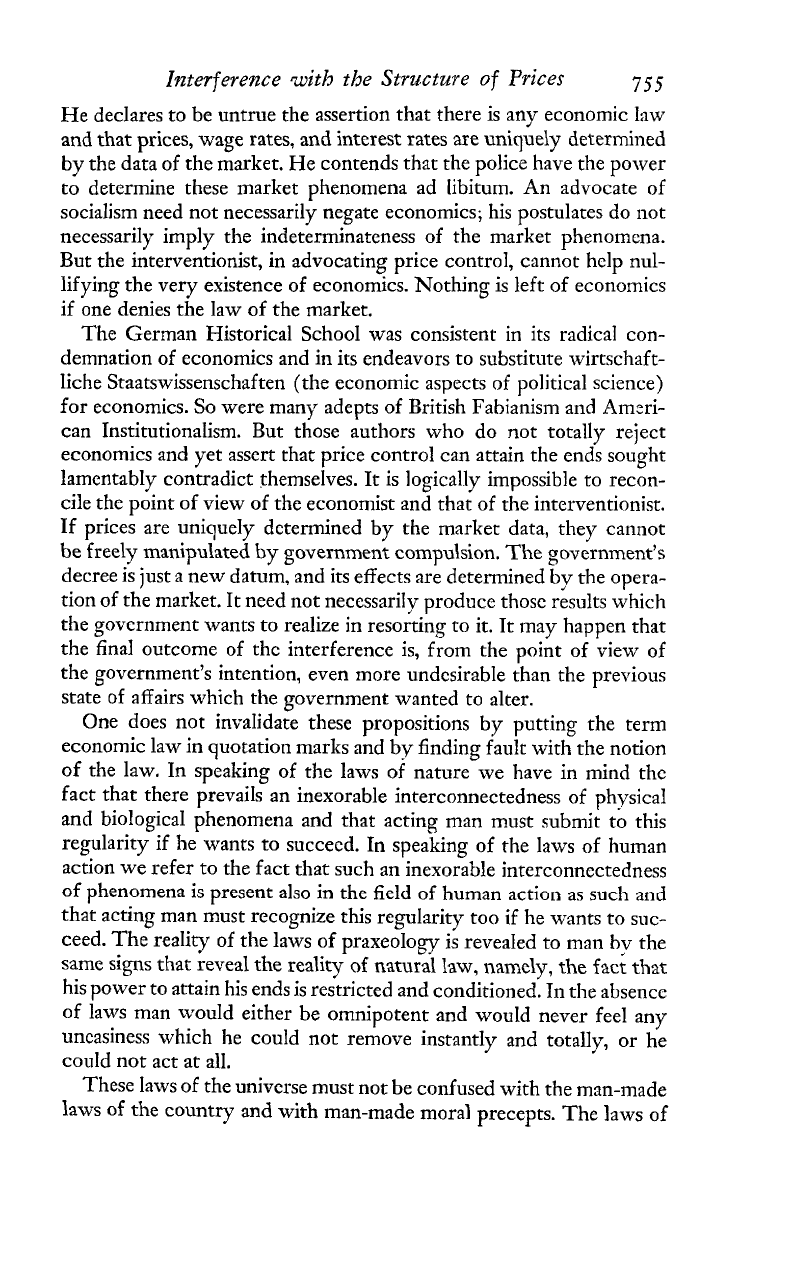
interference
with
the Structu~e
of
Prices
755
He declares to be untrue the assertion that there is any economic law
and that prices, wage rates, and interest rates are uniquely determined
by
the data of the market.
He
contends that the police have the power
to determine these market phenomena ad libitum. An advocate of
socialjsm need not necessarily negate economics; his postulates do not
necessarily imply the indeterminateness of the market phenomena.
But the interventionist, in advocating price control, cannot help nul-
lifying the very existence of economics. Nothing is left of economics
if one denies the law of the market.
The German Historical School was consistent in its radical con-
demnation of economics and in its endeavors to substitute wirtschaft-
liche Staatswissenschaften (the economic aspects of political science)
for economics. So were many adepts of British Fabianism and Am~ri-
can Institutionalism. But those authors who do not totally reject
economics and yet assert that price control can attain the ends sought
lamentably contradict themselves. It is logically impossible to recon-
cile the point of view of the econonlist and that of the interventionist.
If prices are uniquely determined by the market data, they cannot
be freely manipulated by government compulsion.
The
government's
decree is just a new datum, and its effects are determined by the opera-
tion of the market. It need not necessarily produce those results which
the govcrnrnent wants to realize
in
resorting to it. It may happen that
the final outcome of the interference is, from the point of view of
the government's intention, even more undesirable than the previous
state of affairs which the government wanted to alter.
One does not invaIidate these propositions by putting the term
economic law in quotation marks and by finding fault with the notion
of the law. In speaking of the laws of nature we have in mind the
fact that there prevails an inexorable interconnectedness of physical
and biological phenomena and that acting man must submit to this
regularity if he wants to succeed. In speaking of the laws of human
action we refer to the fact that such an inexorable interconnectedness
of phenomena is present also in the field of human action as such and
that acting man must recognize this regularity too if he wants to suc-
ceed. The reality of the laws of praxeology is revealed to man by the
same signs that reveal the reality of natural law, namely, the fact that
his power to attain his ends is restricted and conditioned. In the absence
of laws man would either be omnipotent and would never feel any
uneasiness which he could not remove instantly
and
totally, or he
could not act at all.
These laws of the universe must not be confused with the man-made
laws
of
the country and with man-made moral precepts. The laws of
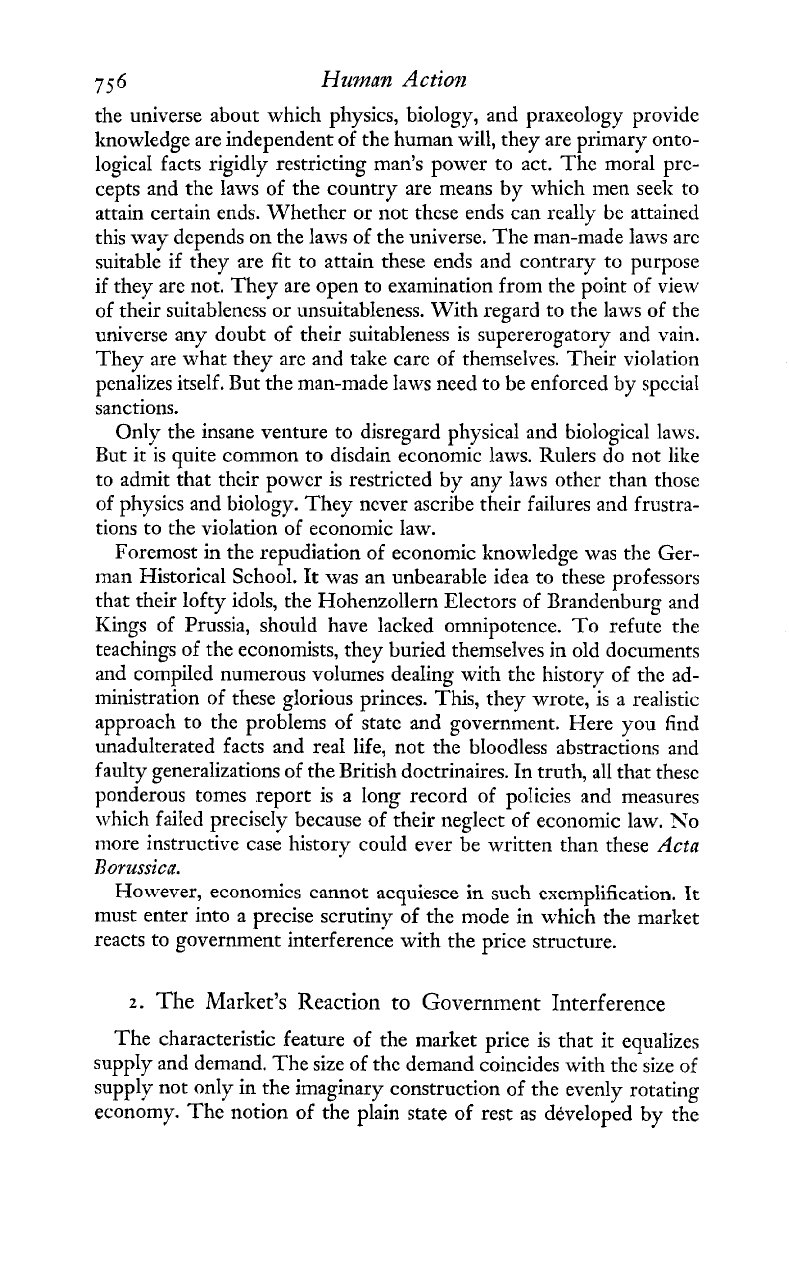
756
Hurnan
Action
the universe about which physics, biology, and praxeology provide
knowledge are independent of the human will, they are primary onto-
logical facts rigidly restricting man's power to act. The moial prc-
cepts and the laws of the country are means by which men seek to
attain certain ends. Whether or not these ends can really be attained
this way depends on the laws of the universe. The man-made laws arc
suitable if they are fit to attain these ends and contrary to purpose
if they are not. They are open to examination from the point of view
of their suitableness or unsuitableness. With regard to the laws of the
universe any doubt of their suitableness is supererogatory and vain.
They are what they arc and take care of themselves. Their violation
penalizes itself. But the man-made laws need to be enforced by special
sanctions.
Only the insane venture to disregard physical and biological laws.
But
it
is quite common to disdain economic laws. Rulers do not like
to admit that their power is restricted by any laws other than those
of physics and biology. They never ascribe their failures and frustra-
tions to the violation of economic law.
Foremost in the repudiation of economic knowledge was the Ger-
man Historical School.
It
was an unbearable idea to these professors
that their lofty idols, the Hohenzollern Electors of Brandenburg and
Kings of Prussia, should have lacked ornnipotcnce. To refute the
teachings of the economists, they buried themselves in old documents
and compiled numerous volumes dealing with the history of the ad-
ministration of these glorious princes. This, they wrote, is a realistic
approach to thc problems of statc and government. Here you find
unadulterated facts and real life, not the bloodless abstractions and
faulty generalizations of the British doctrinaires. In truth, all that these
ponderous tomes report is a long record of policies and measures
which failed precisely because of their neglect of economic law.
x~
more instructive case history could ever be written than these
Actn
Rorussica.
Eowever,
ec~mmics
c=mr
accuiesce
1
i::
mch
exemi;!ifica;ioi;.
It
must enter into a precise scrutiny of the mode in which the market
reacts to government interference with the price structure.
2.
The Market's Reaction to Government Interference
The characteristic feature of the market price is that it equalizes
supply and demand. The size of the demand coincides with the size
of
supply not onIy in the imaginary construction of the evenly rotating
economy. The notion
of
the plain state of rest as developed
by
the
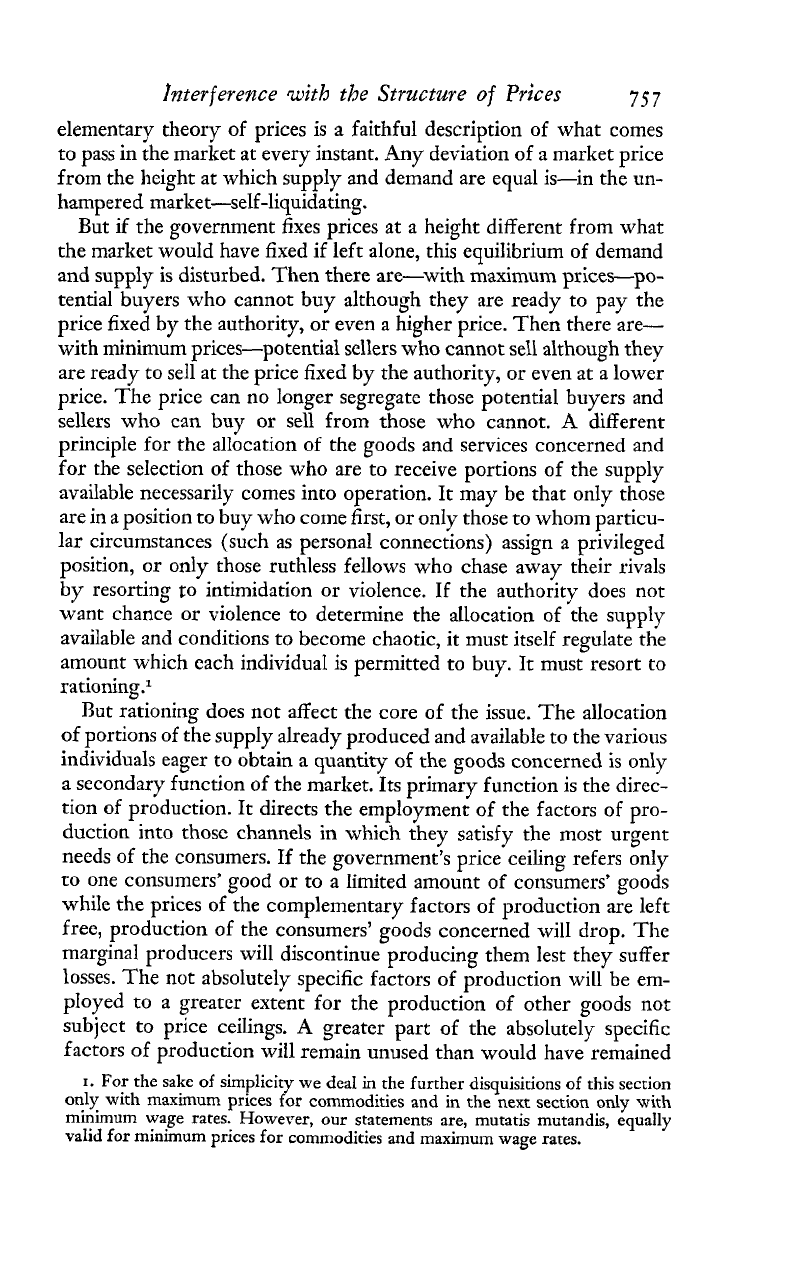
Interference with the Structure
of
Prices
757
elementary theory of prices is a faithful description of what comes
to pass in the market at every instant. Any deviation of a market price
from the height at which supply and demand are equal is-in the un-
hampered market-self-liquidating.
But if the government fixes prices at a height different from what
the market would have fixed if left alone, this equilibrium of demand
and supply is disturbed. Then there are-with maximum prices-po-
tential buyers who cannot buy although they are ready to pay the
price fixed by the authority, or even a higher price. Then there are-
with minimum prices-potential sellers who cannot sell although they
are ready to sell at the price fixed by the authority, or even at a lower
price. The price can no longer segregate those potential buyers and
sellers who can buy or sell from those who cannot.
A
different
principle for rhe allocation of the goods and services concerned and
for the selection of those who are to receive portions of the supply
available necessarily comes into operation. It may be that only those
are in a position to buy who come first, or only those to whom particu-
lar circumstances (such as personal connections) assign a privileged
position, or only those ruthless fellows who chase away their rivals
by resorting to intimidation or violence. If the authority does not
want chance or violence to determine the allocation of the supply
available and conditions to become chaotic, it must itself regulate the
amount which each individuaI is permitted to buy. It must resort to
rationing."
But rationing does not affect the core of the issue. The allocation
of portions of the supply already produced and available to the various
individuals eager to obtain a quantity of the goods concerned is only
a secondary function of the market. Its primary function is the direc-
tion of production. It directs the employment of the factors of pro-
duction into those channels in which they satisfy the most urgent
needs of the consumers. If the government's price ceiling refers only
to one consumers' good or to a limited amount of consumers' goods
while the prices of the complementary factors of production are left
free, production of the consumers1 goods concerned will drop. The
marginal producers will discontinue producing them lest they suffer
losses. The not absolutely specific factors of production will be em-
ployed to a greater extent for the production of other goods not
subject to price ceilings.
A
greater part of the absolutely specific
factors of production will remain unused than would have remained
I.
For the sake of simplicity we deal
in
the further disquisitions of this section
only with maximum prices for commodities and in the next section only
with
minimum wage rates. However, our statements are, mutatis mutandis, equally
valid for minimum prices for commodities and maximum wage rates.
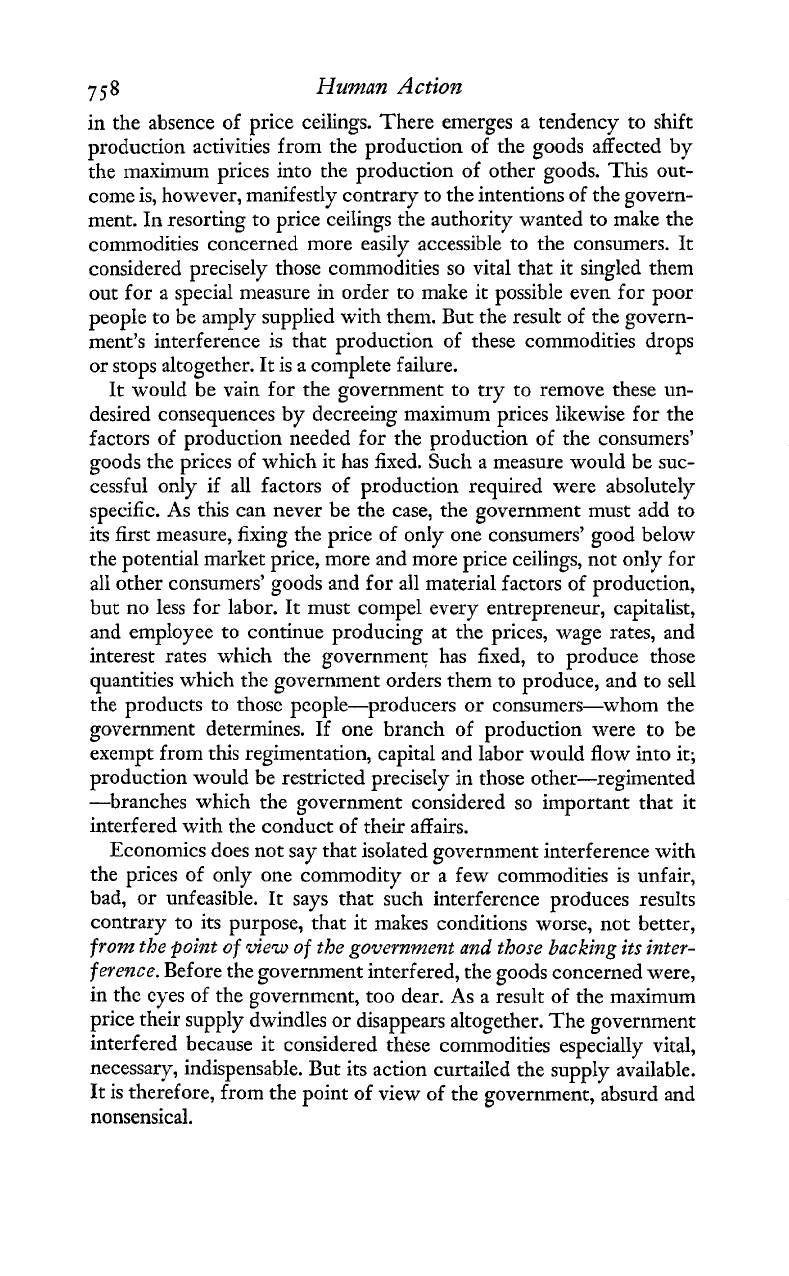
758
Human
Action
in the absence of price ceilings. There emerges a tendency to shift
production activities from the production of the goods affected by
the maximum prices into the production of other goods. This out-
come is, however, manifestly contrary to the intentions of the govern-
ment. In resorting to price ceilings the authority wanted to make the
commodities concerned more easily accessible to the consumers. It
considered precisely those commodities so vital that it singled them
out for a special measure in order to make it possible even for poor
people to be amply supplied with them. But the result of the govern-
ment's interference is that production of these commodities drops
or stops altogether. It is a complete failure.
It would be vain for the government to try to remove these un-
desired consequences by decreeing maximum prices likewise for the
factors of production needed for the production of the consumers'
goods the prices of which it has fixed. Such a measure would be suc-
cessful only if all factors of production required were absolutely
specific. As this can never be the case, the government must add to
its first measure, fixing the price of only one consumers' good below
the potential market price, more and more price ceilings, not only for
all other consumers' goods and for all material factors of production,
but no less for labor. It must compel every entrepreneur, capitalist,
and employee to continue producing at the prices, wage rates, and
interest rates which the government has fixed, to produce those
quantities which the government orders them to produce, and to sell
the products to those people-producers or consumers-whom the
government determines. If one branch of production were to be
exempt from this regimentation, capital and labor would flow into it;
production would be restricted precisely in those other-regimented
-branches which the government considered so important that it
interfered with the conduct of their affairs.
Economics does not say that isolated government interference with
the prices of only one commodity or a few commodities is unfair,
bad, or unfeasibie. it says that such interference produces resuits
contrary to its purpose, that it makes conditions worse, not better,
from
the
point
of
view
of
the government and those backing
ks
inter-
f
erence. Before the government interfered, the goods concerned were,
in the eyes of the government, too dear. As a result of the maximum
price their supply dwindles or disappears altogether. The government
interfered because it considered these commodities especially vital,
necessary, indispensable. But its action curtailed the supply available.
It is therefore, from the point of view of the government, absurd and
nonsensical.
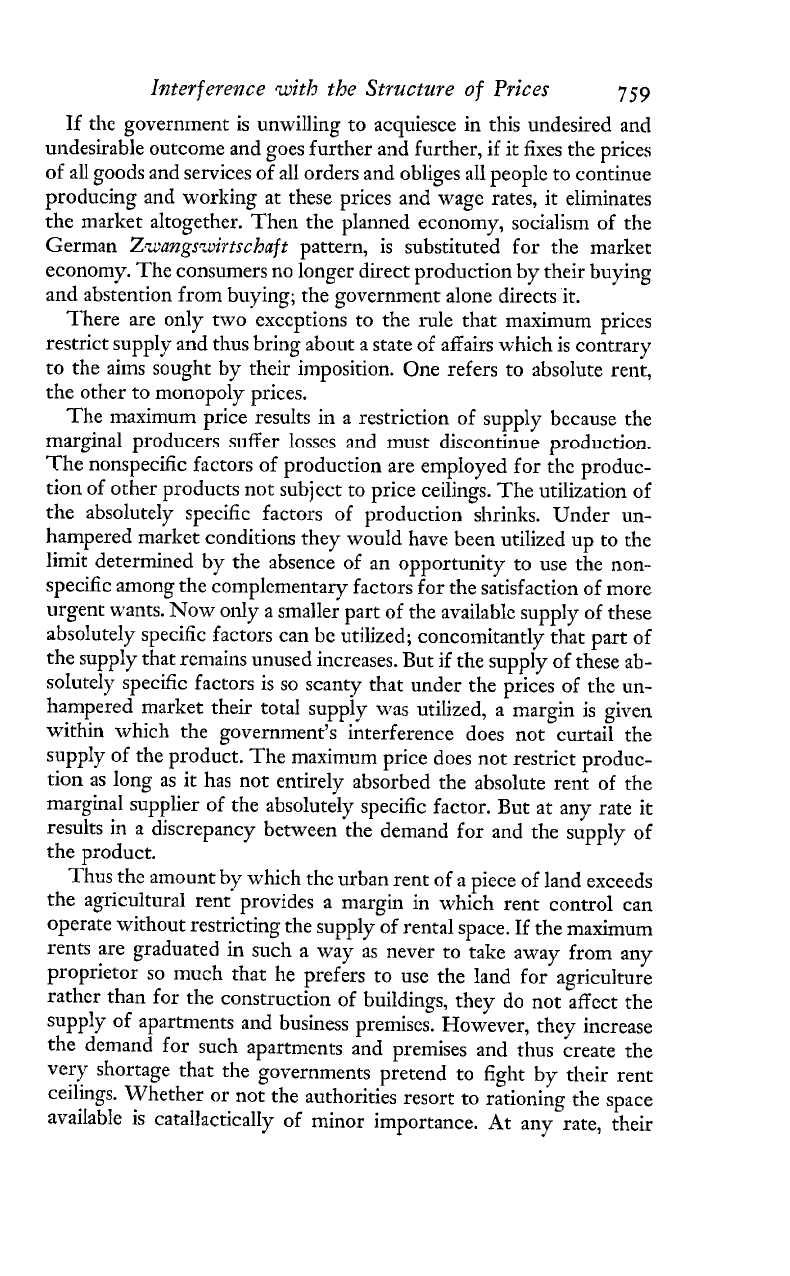
Interference
with
the Structure
of
Prices
7
59
If the government is unwilling to acquiesce in this undesired and
undesirable outcome and goes further and further, if it fixes the prices
of all goods and services of all orders and obliges a11 people to continue
producing and working at these prices and wage rates, it eliminates
the market altogether. Then the planned economy, socialism of the
German
Zwangs~vimchaft
pattern, is substituted for the market
economy. The consumers no longer direct production by their buying
and abstention from buying; the government alone directs it.
There are only two exceptions to the rule that maximum prices
restrict supply and thus bring about a state of affairs which is contrary
to the ai~ns sought by their imposition. One refers to absolute rent,
the other to monopoly prices.
The maximum price results in a restriction of supply because the
marginal producers suffer losses and must discontinue production.
The nonspecific factors of production are employed for the produc-
tion of other products not subject to price ceilings. The utilization of
the absolutely specific factors of production shrinks. Under un-
hampered market conditions they would have been utilized up to the
limit determined by the absence of an opportunity to use the non-
specific among the complementary factors for the satisfaction of more
urgent wants. Now only a smaller part of the available supply of these
absolutely specific factors can be utilized; concomitantly that part of
the supply that remains unused increases. But if the supply of these ab-
solutely specific factors is so scanty that under the prices of the un-
hampered market their total supply was utilized, a margin is given
within which the government's interference does not curtail the
supply of the product. The maximum price does not restrict produc-
tion as long as it has not entirely absorbed the absolute rent of the
marginal supplier of the absolutely specific factor.
But
at
any
rate it
results in a discrepancy between the demand for and the supply of
the product.
Thus the amount by which the urban rent of a piece of land exceeds
the agricuiturai rent provides
a
margin in which rent control can
operate without restricting the supply of rental space. If the maximum
rents are graduated in such a way as never to take away from any
proprietor so much that he prefers to use the land for agriculture
rather than for the construction of buildings, they do not affect the
supply of apartments and business premises. However, they increase
the demand for such apartments and premises and thus create the
very shortage that the governments pretend to fight by their rent
ceilings. Whether or not the authorities resort to rationing the space
availabIe is catallacticalIy of minor importance. At any rate, their
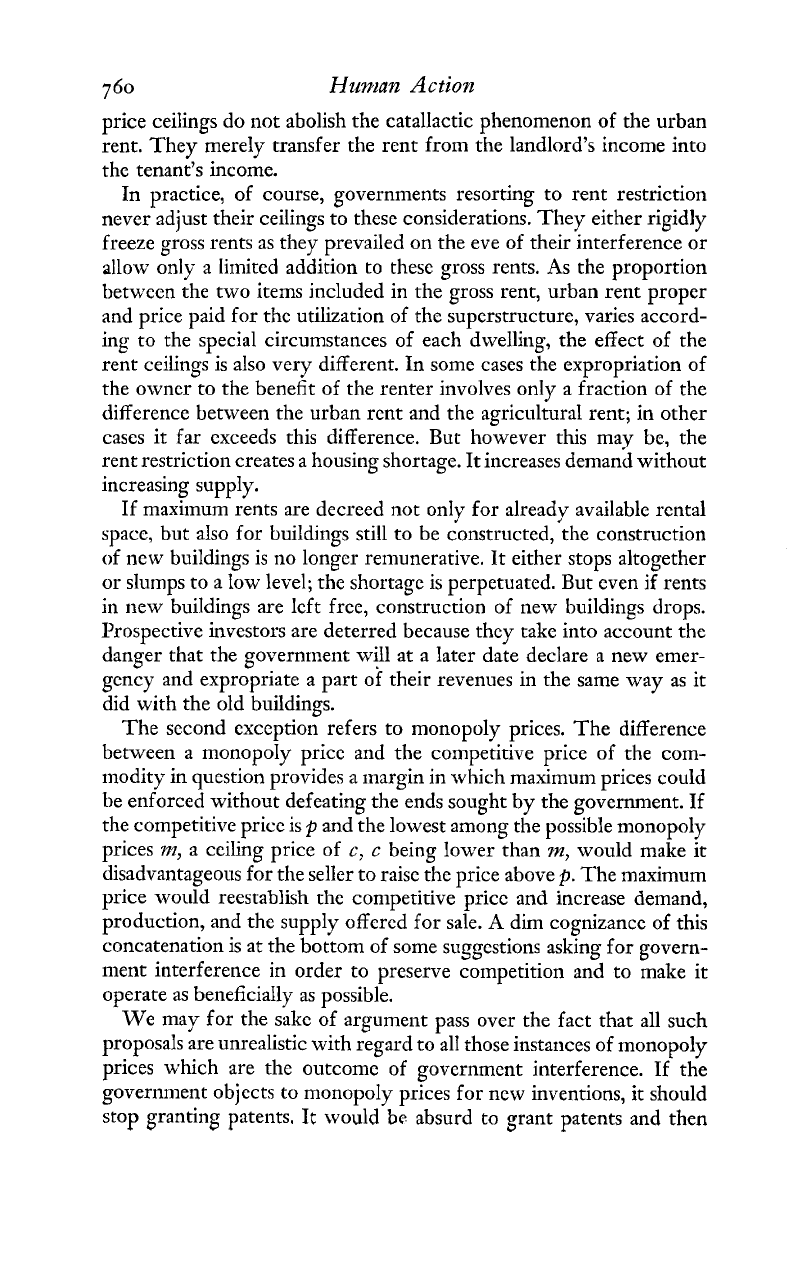
760
Human
Action
price ceilings do not abolish the catallactic phenomenon of the urban
rent. They merely transfer the rcnt from the landlord's income into
the tenant's income.
In practice, of course, governments resorting to rent restriction
never adjust their ceilings to these considerations. They either rigidly
freeze gross rents as they prevailed on the eve of their interference or
allow only a lirnited addition to these gross rents. As the proportion
between the two items included in the gross rent, urban rent proper
and price paid for thc utilization of the superstructure, varies accord-
ing to the special circumstances of each dwelling, the effect of the
rent ceilings is also very different. In some cases the expropriation of
the owner to the benefit of the renter involves only a fraction of the
difference between the urban rcnt and the agricultural rent; in other
cases it far cxceeds this difference. But however this may be, the
rent restriction creates a housing shortage. It increases demand without
increasing supply.
If maximum rents are decreed not only for already available rental
spacc, but also for buildings still to be constructed, the construction
of new buildings is no longer remunerative. It either stops altogether
or slumps to
a
low level; the shortage is perpetuated. But even if rents
in new buildings are left free, construction of new buildings drops.
Prospective investors are deterred because they cake into account the
danger that the government will at a later date declare a new emer-
gcncy and expropriate a part of their revenues in the same way as it
did with the old buildings.
The second exception refers to monopoly prices. The difference
between a monopoIy price and the competitive price of the com-
modity in question provides a margin in which maximum prices could
be enforced without defeating the ends sought by the government. If
the competitive pricc is
p
and the lowest among the possible monopoly
prices
nz)
a ceiling price of
c,
c being lower than
m,
would make it
disadvantageous for the seller to raisc the price above
p.
The maximum
price would reescabiish the competitive pricc and increase demand,
production, and the supply offered for sale. A dim cognizance of this
concatenation is at the bottom of some suggcstions asking for govern-
ment interference in order to preserve co~npetition and to make it
operate as beneficially as possible.
We may for the sake of argument pass over the fact that all such
proposals are unrealistic with regard to all those instances of rnonopoly
prices which are the outcome of government interference. If the
government objccts to monopoly prices for ncw inventions, it should
stop granting patents,
It
would
be
absurd to grant patents and then
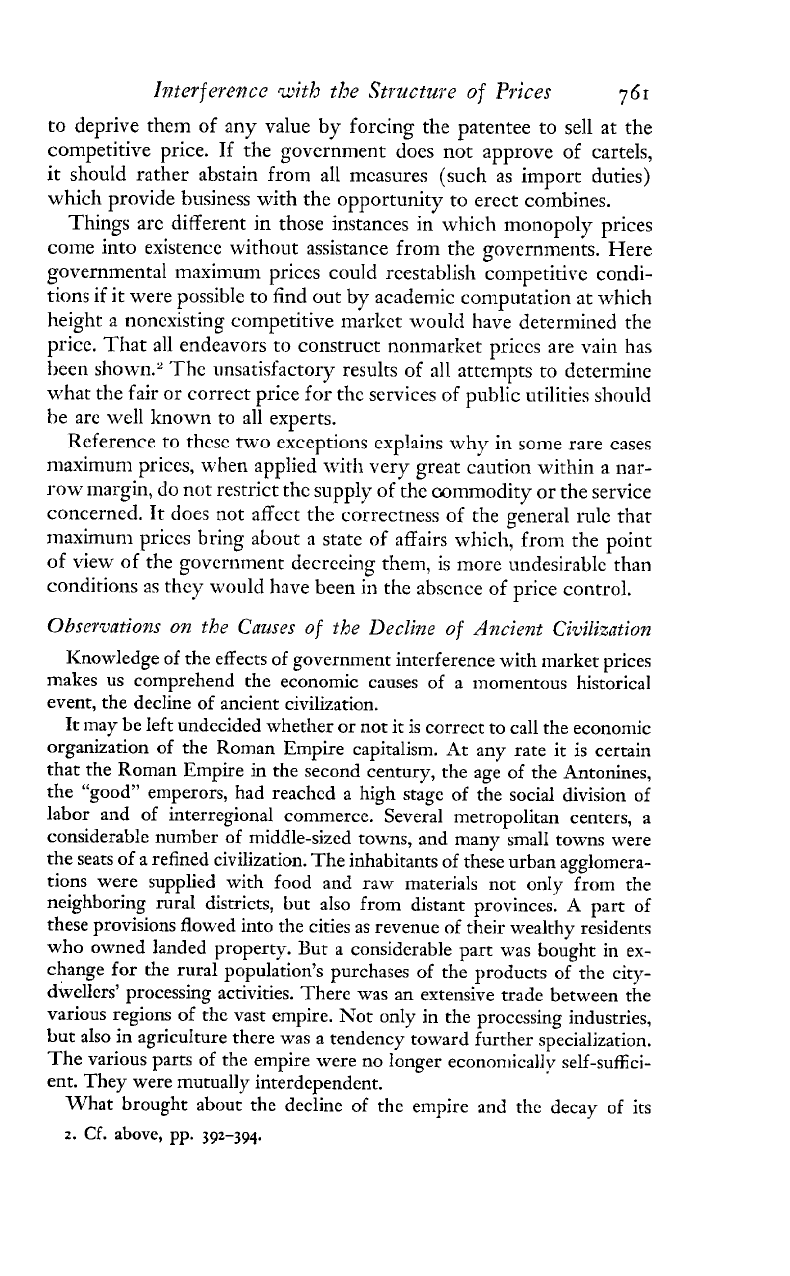
Interference
with
the
Stmcture
of Prices
761
to deprive them of any value by forcing the patentee to sell at the
competitive price. If the government does not approve of cartels,
it should rather abstain from all measures (such as import duties)
which provide business with the opportunity to erect combines.
Things arc ditferent in those instances in which monopoly prices
come into existence without assistance from the governments. Here
governmental maximum priccs could reestablish competitive condi-
tions if it were possible to find out
by
academic computation at which
height
a
nonexisting competitive marlict would have determined the
price. That all endeavors to construct normarket prices are vain has
heen shown.' The unsatisfactory results of all attempts to determine
urhat the fair or correct price
for
the services
of
public utilities should
be are well known to all experts.
Reference to these two exceptions explains why in some rare cases
maximum prices, when applied with very great caution within a nar-
I-ow
margin, do not restrict thc supply of the oornmodity or the service
concerned.
It
does not affect the correctness of the general rule that
maximum prices bring about a state
of affairs which, from the point
of view of the government decreeing them, is more undesirable than
conditions as they would have been in the abscnce of price control.
Observations on the Causes of the Decline of Ancient Civilization
Knowledge of the effects of government interference with market prices
makes us comprehend the economic causes of a momentous historical
event, the decline of ancient civilization.
It may
be
Ieft undecided whether or not it is correct to call the economic
organization of the Roman Empire capitalism. At any rate it
is
certain
that the Roman Empire in the second century, the age of the Antonines,
the "good" emperors, had reachcd a high stage of the social division of
labor and of interregional commerce. Several metropolitan centers, a
considerable number of middle-sized towns, and many small towns were
the seats of a refined civilization. The inhabitants of these urban agglomera-
tions were supplied with food and raw materials not onIy from the
neighboring rural districts, but also from distant provinces. A part of
these provisions flowed into the cities as revenue of their wealthy residents
who owned landed property. But
a
considerable part u7as bought in ex-
change for the rural population's purchases of the products of the city-
dwellers' processing activities. There was an extensive trade between the
various regions of the vast empire. Not only in the processing industries,
but also in agricuiture there was a tendency toward further specialization.
The various parts of the empire were no longer econon~ically self-suffici-
ent. They were mutually interdependent.
What brought about the decline of the empire and the decay
of
its
2.
Cf.
above,
pp.
392-394.
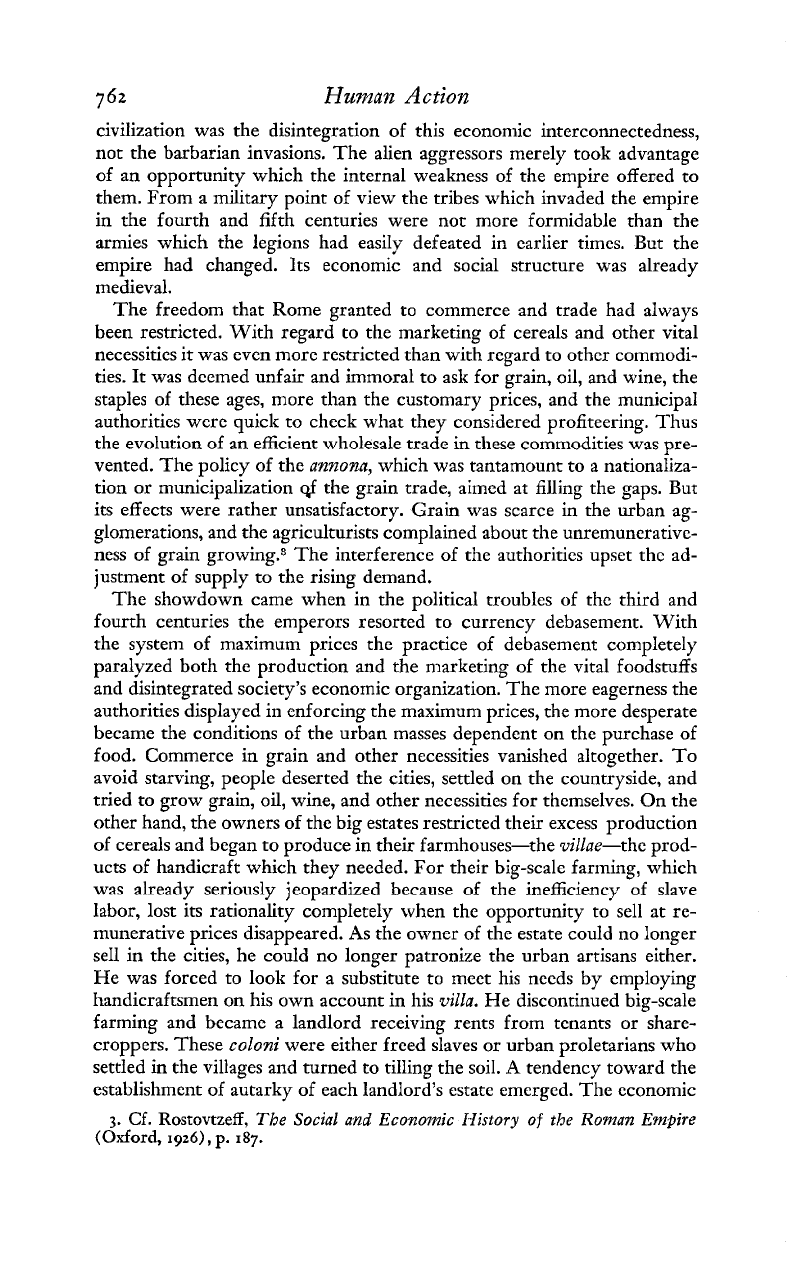
762
Human
Action
civilization was the disintegration of this econonlic interconnectedness,
not the barbarian invasions. The alien aggressors merely took advantage
of an opportunity which the internal weakness of the empire offered to
them. From a military point of view the tribes which invaded the empire
in the fourth and fifth centuries were not more formidable than the
armies which the legions had easily defeated in earlier times. But the
empire had changed. Its economic and social structure was already
medieval.
The freedom that Rome granted to commerce and trade had always
been restricted. With regard to the marketing of cereals and other vital
necessities it was even more restricted than with regard to other commodi-
ties.
It
was deemed unfair and immoral to ask for grain, oil, and wine, the
staples of these ages, more than the customary prices, and the municipal
authorities were quick to check what they considered profiteering. Thus
the evolution of an eficient wholesale trade in these commodities was pre-
vented. The policy of the annonn, which was tantamount to a nationaliza-
tion or municipalization
qf
the grain trade, aimed at filling the gaps. But
its effects were rather unsatisfactory. Grain was scarce in the urban ag-
glomerations, and the agriculturists complained about the unremunerative-
ness of grain gro~ing.~ The interference of the authorities upset the ad-
justment of supply to the rising demand.
The showdown came when in the political troubles of the third and
fourth centuries the emperors resorted to currency debasement. With
the system of maximum prices the practice of debasement completely
paralyzed both the production and the marketing of the vital foodstuffs
and disintegrated society's economic organization. The more eagerness the
authorities displayed in enforcing the maximum prices, the more desperate
became the conditions of the urban masses dependent on the purchase of
food. Commerce in grain and other necessities vanished altogether. To
avoid starving, people deserted the cities, settled on the countryside, and
tried to grow grain, oil, wine, and other necessities for thcmselvcs. On the
other hand, the owners of the big estates restricted their excess production
of cereals and began to produce in their farmhouses-the villae-the prod-
ucts of handicraft which they needed. For their big-scale farming, which
was
already
serio~lsly jeopardized hecause of the Inefficiency of slave
labor, lost its rationality completely when the opportunity to sell at re-
munerative prices disappeared. As the owner of the estate could no longer
seIl in the cities, he could no longer patronize the urban artisans either.
He was forced to look for a substitute to meet his needs by employing
handicraftsmen on his own account in his villa. He discontinued big-scale
farming and became a landlord receiving rents from tenants or share-
croppers. These coloni were either freed slaves or urban proletarians who
settled in the villages and turned to tilling the soil.
A
tendency toward the
establishment of autarky of each landlord's estate emerged. The cconomic
3.
Cf.
Rostovtzeff,
The Social
and
Economic History of the Ronzan Empire
(Oxford,
1926),
p.
187.
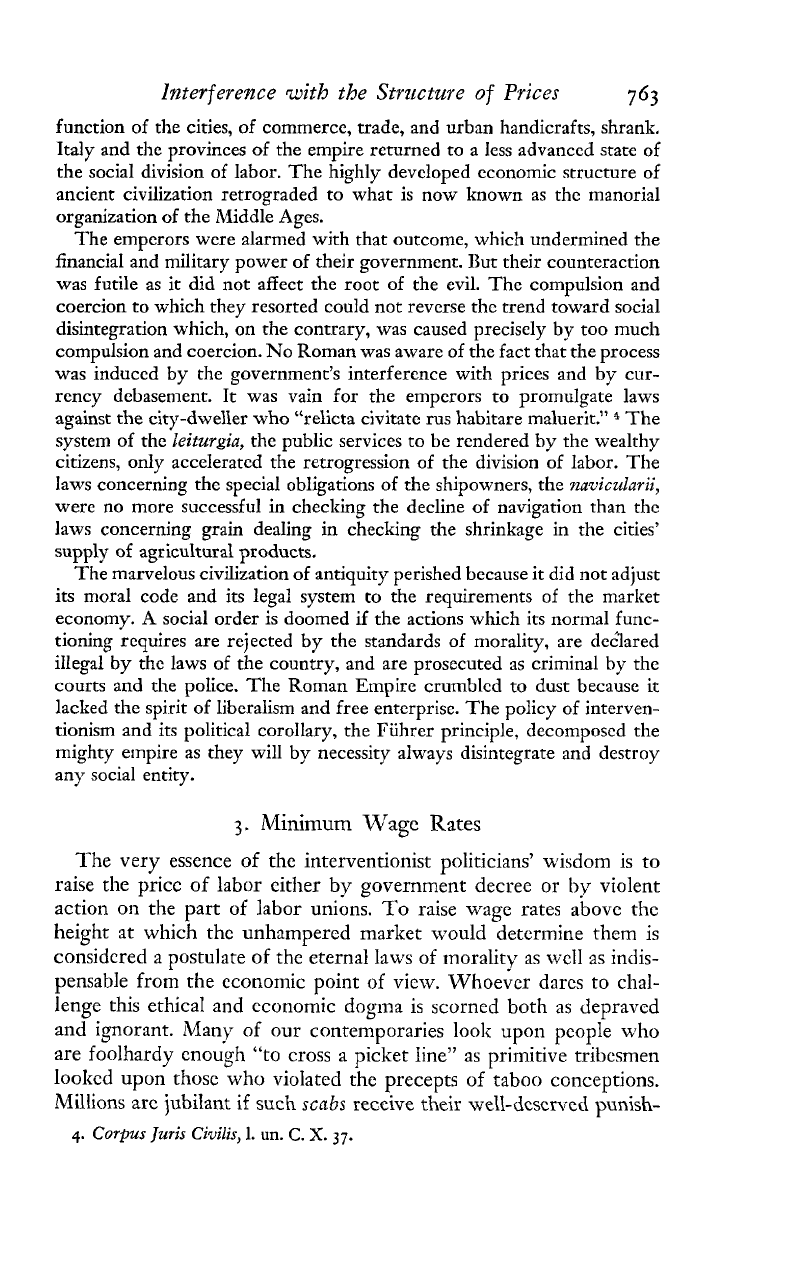
Interference with the Structure
of
Prices
763
function of the cities, of commerce, trade, and urban handicrafts, shrank.
Italy and the provinces of the empire returned to a less advanced state of
the social division of labor. The highly developed economic structure of
ancient civilization retrograded to what is now known as the manorial
organization of the Middle Ages.
The emperors were alarmed with that outcome, which undermined the
financial and military power of their government. But their counteraction
was futile as it did not affect the root of the evil. The compulsion and
coercion to which they resorted could not reverse the trend toward social
disintegration which, on the contrary, was caused precisely by too much
compulsion and coercion. No Roman was aware of the fact that the process
was induccd by the government's interference with prices and by cur-
rency debasement. It was vain for the emperors to promulgate laws
against the city-dweller who "relicta chitate rus habitare maluerit." The
system of the
leiturgia,
the public services to be rendered by the wealthy
citizens, only accelerated the retrogression of the division of labor. The
laws concerning the special obligations of the shipowners, the
navicularii,
were no more successful in checking the decline of navigation than thc
laws concerning grain dealing
in
checking the shrinkage in the cities'
supply of agricultural products.
The marvelous civilization of antiquity perished because it did not adjust
its moral code and its legal system to the requirements of the market
economy.
A
social order is doomed if the actions which its normal func-
tioning rcquires are rejected by the standards of morality, are dedared
iI1egal by the laws of the country, and are prosecuted as criminal by the
courts and the police.
The
Roman Etnpire crumbled to dust because it
lacked the spirit of liberalism and free enterprise. The policy of interven-
tionism and its political corollary, the Fiihrer principle, decomposed the
mighty empire as they will by necessity always disintegrate and destroy
any social entity.
3.
Minimum
Wage Rates
The very essence of the interventionist politicians' wisdom is to
raise the price of labor either by government decree or
b\;
violent
action on the part of labor unions. To raise wage rates above the
height at which the unhampered market would determine them is
considered
a postulate of the eternal laws of morality as well as indis-
pensable from the economic point
of
view. ~hoe;er dares to chal-
lenge this ethicaI and economic dogma is scorned both as depraved
and ignorant. Man\; of our contemporaries look upon people who
are foolhardy cnouih "to cross a picket line" as primitive tribesmen
looked upon those who violated the precepts of taboo conceptions.
Millions are jubilant
if
such
scabs
receive
their
well-dcscrvccl
punish-
4.
Corpus Juris Civilis,
1.
un.
C.
X.
37.
